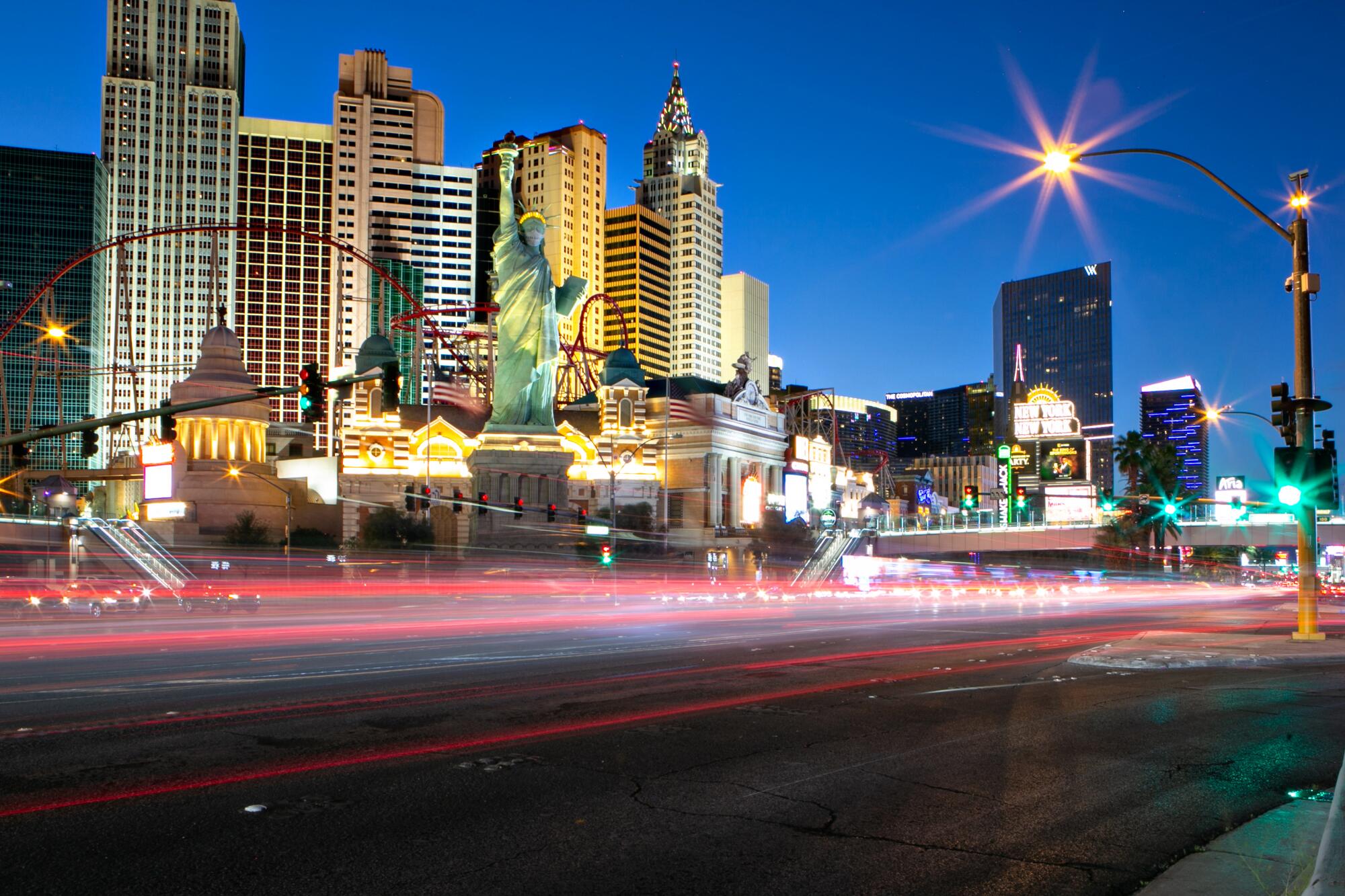
- Share via
LAS VEGAS — He wore a silk shirt and kept a slight scent of cologne about him. He liked to talk. There was always someone to talk to, like the production assistant from Los Angeles who blew $1,200 on video poker. They all brought their stories to the 40-foot marble bar at the Rio hotel, and later to a less glamorous joint a few miles from the Strip.
It was a good life, and through the years, Bernard Sykes met Hollywood actresses and local characters, professional athletes including Mike Tyson, and first-time visitors to the United States. Sometimes, as customers swigged beers and sipped martinis, sharing the kind of intimacies told only to strangers, they’d slide a $100 bill across the counter as a tip.
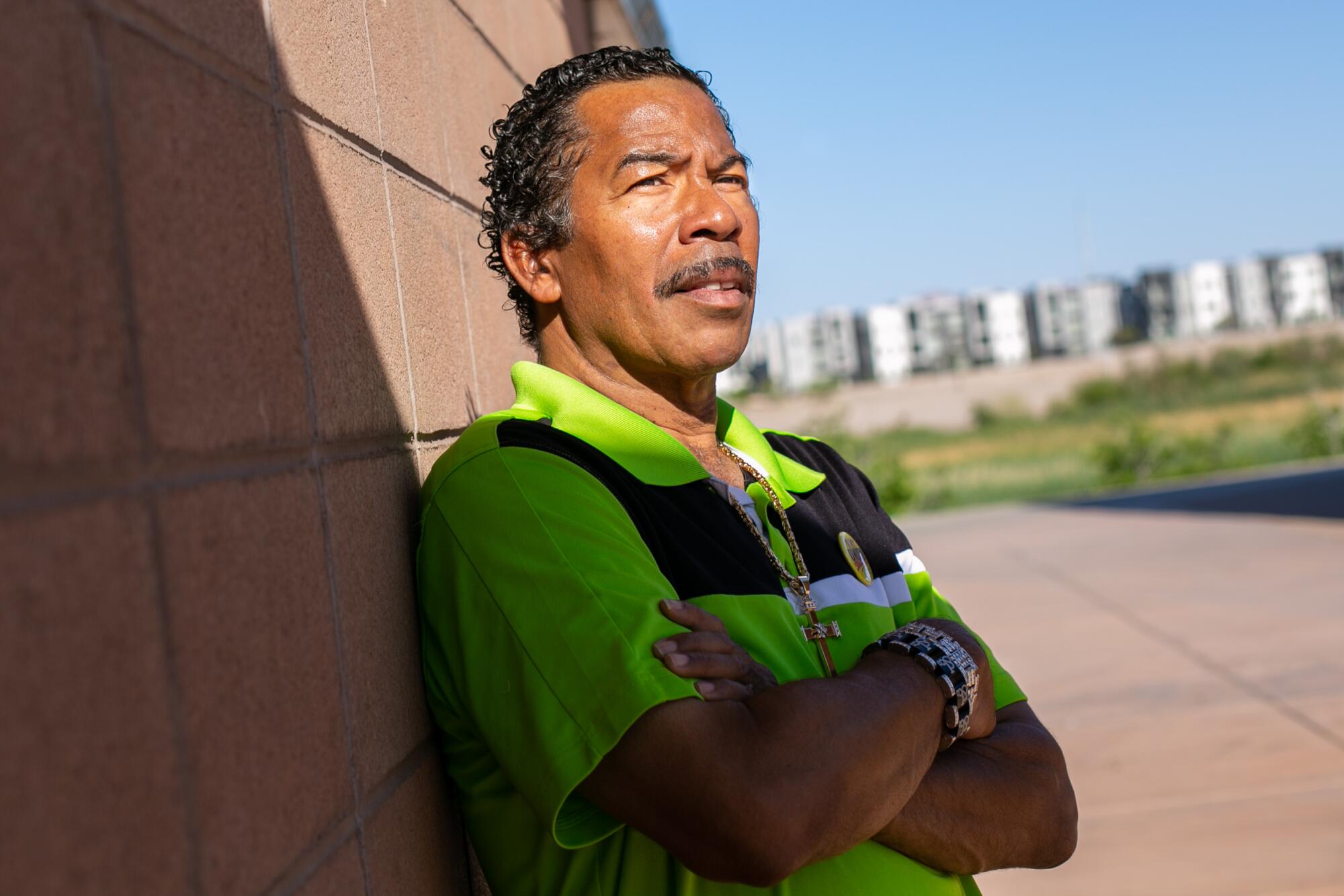
Then, last spring, like a dust devil of bad luck, Sykes’ life shattered.
“They let me go immediately,” Sykes said, recalling the start of pandemic shutdowns that cost him his $14-an-hour job. “I’ve been out of work ever since.”
A year and two months since the coronavirus paralyzed the nation and drove record unemployment — including staggeringly high percentages among service industry employees, who make up more than a quarter of this city’s workforce — the U.S. is emerging from the aftershock of a pandemic crisis that dimmed blackjack tables and led to long lines at food banks.
In Las Vegas, where gambling revenue plummeted by nearly 45% last year and tens of thousands of the city’s service industry employees remain out of work, casinos and restaurants are set to return to full capacity Tuesday. It is, in a sense, a test of America’s ability to reclaim itself. But the contours of that comeback are not fully drawn, and many wonder whether they will return to the livelihoods they lost or be forced into another year of uncertainty.
“There is all this talk from politicians and whatnot about Vegas coming back,” Sykes said. “But I’m still out of work … [and] so are so many others as well.”
But they’ll be coming soon — at least that’s what elected officials hope: the gamblers, suckers and all the rest, driving across the desert from California or landing at McCarran International Airport with connections from London and Beijing. The Las Vegas Strip’s allure is the promise of escape into a nonstop party, an all-hours pulse shaped by capitalistic excess and the vagaries of chance. The casinos didn’t close for even a day after the 9/11 terrorist attacks or after a 2017 mass shooting along the Strip that left 60 victims dead.
Yet Las Vegas went silent for nearly two months early in the pandemic, and since then, it has returned like a man slipping on his best suit piece by piece, inching back toward the days when the city welcomed a professional football team, hosted a Democratic presidential primary debate and saw its casinos rake in $6.5 billion in the year before people started wearing masks.
By April 2020, the unemployment rate — previously around 4% in Nevada and in Las Vegas — had climbed to nearly 30%. Democratic Gov. Steve Sisolak, who had initially ordered strict shutdowns, allowed casinos to reopen last summer, then lowered capacity limits with the fall and winter coronavirus surges. Capacity restrictions have fluctuated since.
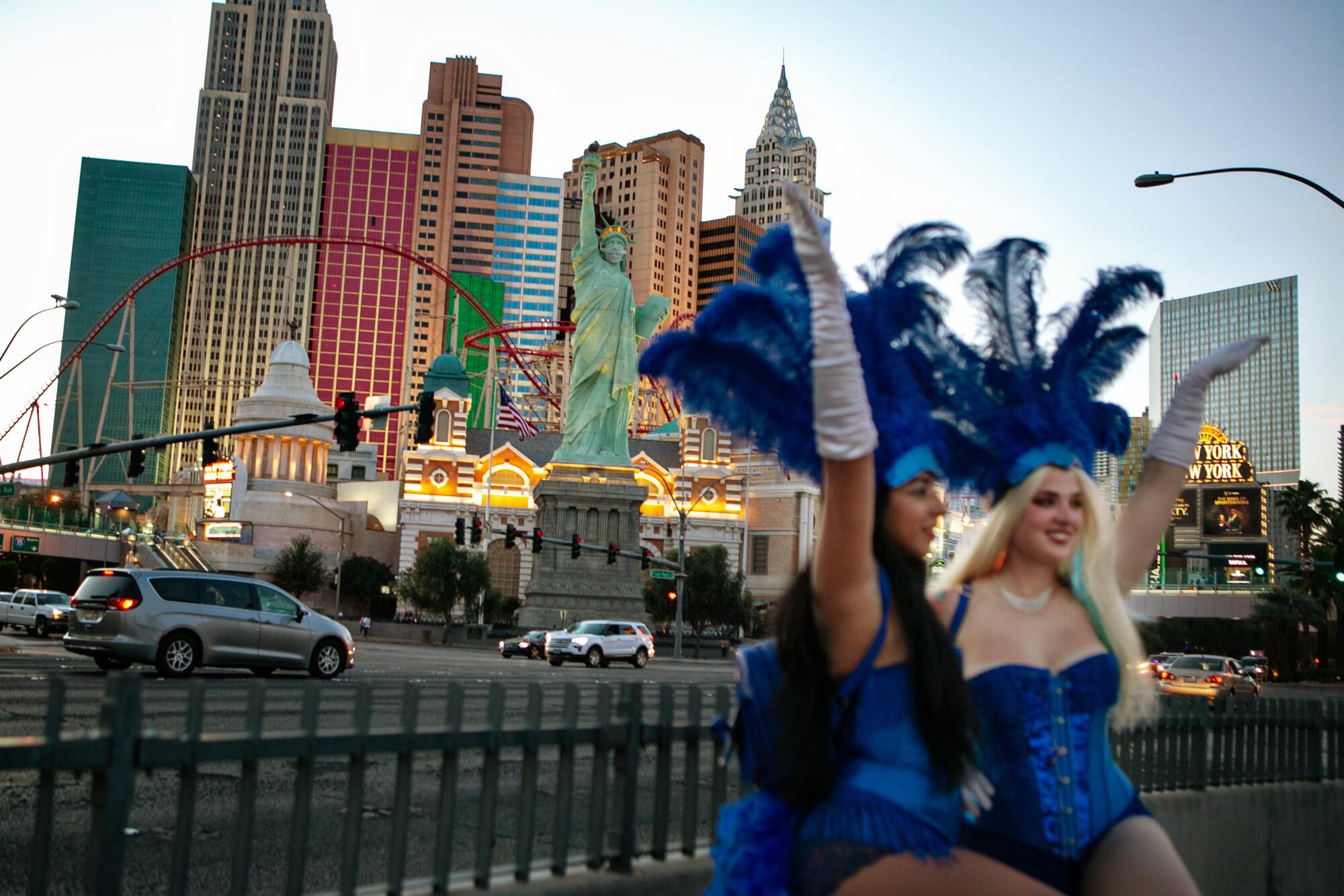
“We’ve taken action to strike a balance between protecting public health and also protecting our fragile economy,” Sisolak said in a public address to Nevadans this month.
But critics say the partial shutdown unnecessarily hurt the state and its economic center of Las Vegas.
“If we had kept things open and observed distancing, we never would have been in this financial mess,” said Oscar Goodman, a former Las Vegas mayor.
The city made headlines in April 2020 when Goodman’s wife, current Las Vegas Mayor Carolyn Goodman, called for casinos and other nonessential businesses to reopen, suggesting that Las Vegas could serve as a test case — or, as she put it, “a control group” — on the dangers of the coronavirus.
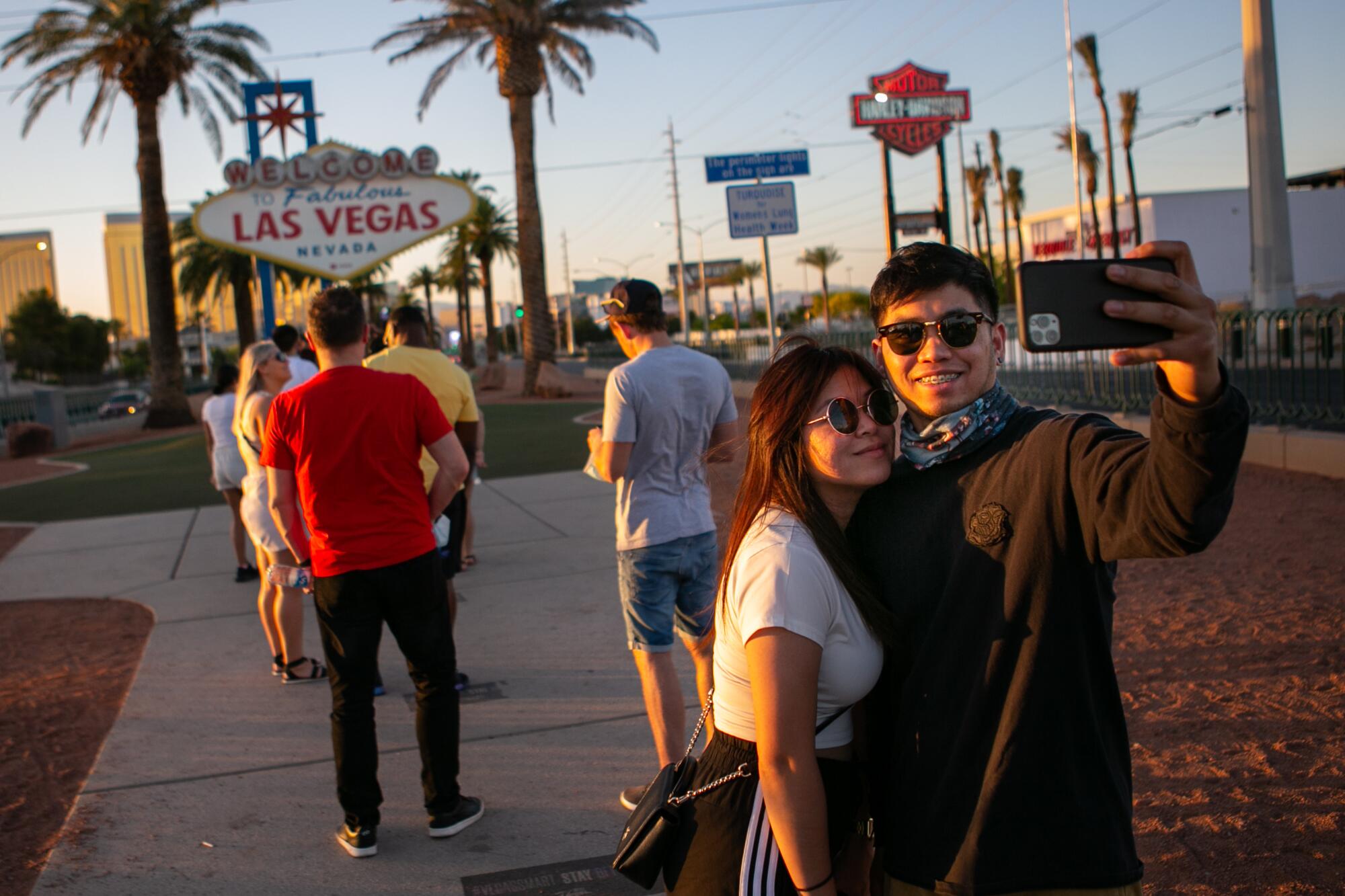
Now, after a year of shutdowns and reopenings, the city is betting on revival.
John Restrepo, a longtime Las Vegas economist, said early revenue projections show tourists are starting to return.
“But how much they spend is another question,” he said. “The economy here is so dependent on tourism. So how the economy improves around the country will dictate how and if Vegas truly bounces back.”
Nevada recently received $4 billion in federal COVID-19 relief funds, with $130 million going directly to Las Vegas. But its comeback will be determined by how safe people feel in convention centers and on gambling floors. New guidelines released this month by the Centers for Disease Control and Prevention say fully vaccinated people do not need to wear masks inside or outside. Most casinos agree.
Las Vegas: The Road Back
This is the first in a series of occasional articles about Las Vegas emerging from the COVID-19 pandemic.
These days, crowds of people gripping yard-tall margaritas have again packed the sidewalks lining the Strip. A familiar, unyielding sun beats down on marquees touting Bruno Mars’ upcoming six-night residency, and this month, the convention center welcomed one of its first trade shows since the shutdowns: the Tobacco Plus Expo. Thousands are expected to attend the World of Concrete trade show in June, featuring a bricklaying championship.
But not everywhere will reopen: Caesars Entertainment recently announced it was closing several smaller entertainment venues and shows.
Tourists stopped on a recent afternoon to snap pictures of the pink 1974 Cadillac Eldorado parked outside A Little White Wedding Chapel, where angels floated on a ceiling painted to look like the sky. Inside, Charolette Richards sat at a desk surrounded by pink walls and reminisced about the six decades she’s been in the Las Vegas wedding industry.
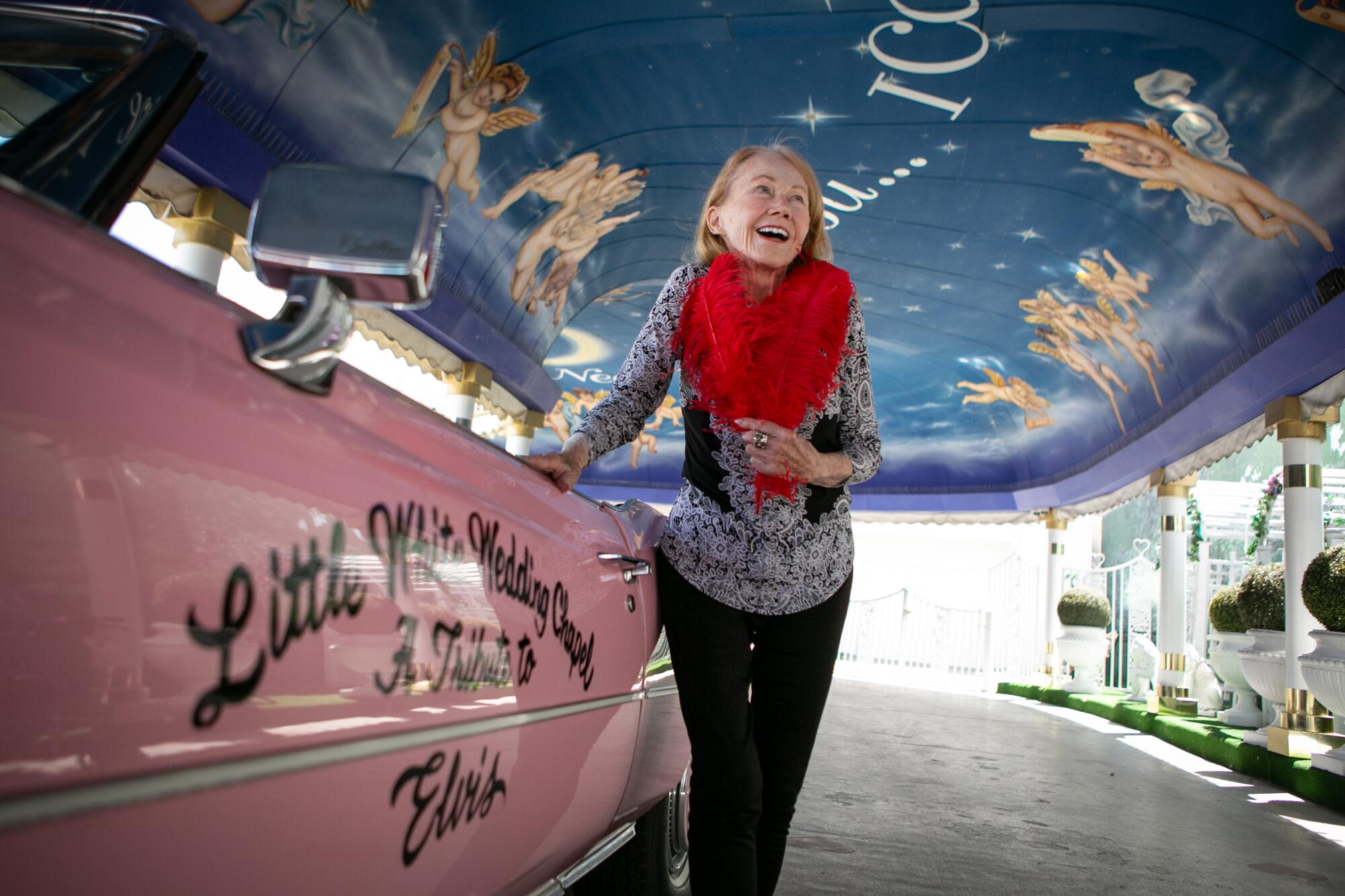
She’s married thousands of couples and overseen the nuptials of many celebrities, she said, including Bruce Willis and Demi Moore.
Las Vegas has more than 50 standalone chapels, which in 2018 generated $2 billion for the local economy. Last year, most had to close in March and April when Clark County suspended issuing marriage licenses.
Richards’ business took a roughly 30% cut last year, but she was luckier than most. The chapel is famous for its drive-through window, so couples don’t even have to get out of their cars for the ceremony.
“The window really saved us,” said Richards, a stylish 86-year-old woman with a soft voice.
A few minutes later, a Nissan SUV pulled up to the window. A woman sat behind the wheel, a white veil draped near her headrest, and her soon-to-be-husband smiled from the passenger’s side. From the back seat, two teenage boys waved.
“This work brings me so much joy,” Richards said. “A joy I leaned on this past year.”
But many locals are still yearning for a return to more stability. The Culinary Workers Union, which represents some 60,000 people who work in hotels here, said 98% of those employees, who are mostly Latino, Black or Asian American, were furloughed at some point during the pandemic shutdowns.
By this month, union officials said, only about half had been called back to work. The union urged state lawmakers in Carson City to pass a right-to-return law that would require employers to offer laid-off casino, hospitality and travel-related workers in Nevada their old or similar jobs before opening the positions to new applicants. Late Monday, as the legislative session adjourned, lawmakers here passed the bill.
California lawmakers recently passed a similar measure.
Still, many workers, including Yaneth Chavez, remain hopeful that they’ll eventually be called back. She’s lived in Las Vegas most of her life, meeting her husband while working at a casino.

For nearly 20 years, she prepared food at the Red Rock Casino. Her $18-an-hour salary helped pay for child care for her two sons, now 8 and 10, and family vacations. But then she got the letter.
“Layoffs at the Red Rock Casino will commence on May, 1, 2020,” it read, “and your layoff will occur at that time.”
“This broke my heart,” Chavez said on a recent morning outside her home in North Las Vegas. “The job gave me purpose.”
Over the last year, Chavez, 39, received unemployment benefits as she searched for new work. Last fall, she got an on-call job working events at Allegiant Stadium, a new multibillion-dollar facility where the NFL’s Raiders play. It’s nothing like the consistency of her casino job, she said, and she’s visited a food bank in recent months.
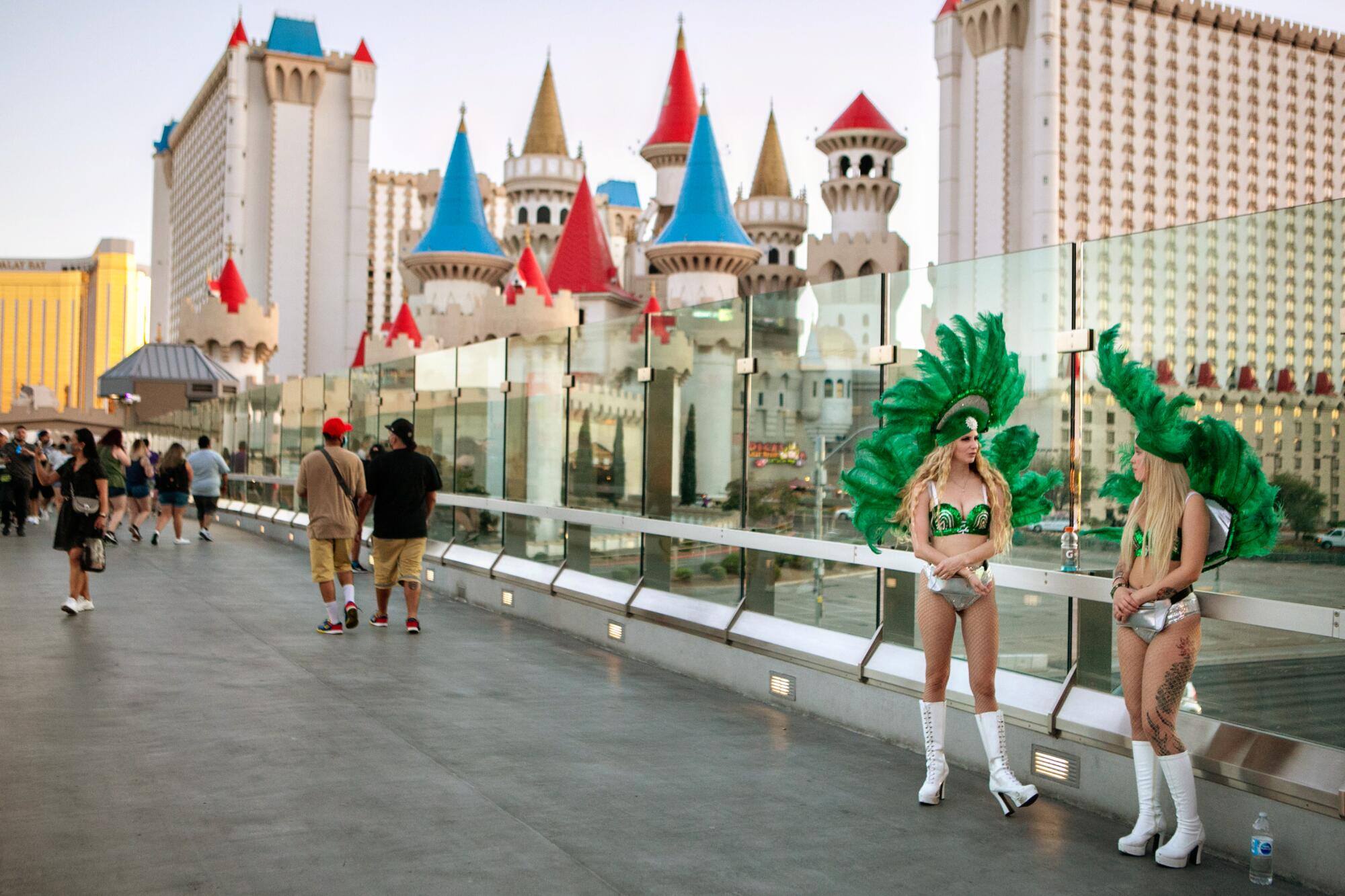
“This has all been very, very stressful,” she said.
For Sykes, the laid-off bartender, his days are now filled with busy work.
He once talked to actress Sanaa Lathan about Las Vegas’ best restaurants and Tyson about an upcoming fight. But he has since removed everything from the closets in his home and sorted through years of clutter. He pawned three diamond rings for $4,000 so he could pay bills. He spends a lot of time with his 3-year-old granddaughter and sometimes hops in his car to drive down Las Vegas Boulevard.
When the pandemic began, he parked and walked down the middle of the empty thoroughfare.
“It took my breath away,” he said. “Never in my life did I think I would see this city grind to a halt.”

Sykes has kept in touch with former co-workers and occasionally visits them inside the casino. The 56-year-old applied to new jobs in Las Vegas but hasn’t received callbacks, and he wonders whether it’s because of his age.
“A lot of these places want young bartenders who look a certain way,” he said.
On a recent afternoon, Sykes sat at a table in a strip mall near the Henderson casino where he once worked. A steady stream of cars pulled in, many of them driven by other locals looking for an excuse to get out of the house after a year of restrictions.
Sykes gazed at the cream-colored building with a massive marquee advertising 18-ounce king cut prime rib for $32. He said he wanted to get back to the man he was. Make some money, pour a drink for a stranger, talk about politics or the weather, listen to the shuffle of cards and the spin of roulette wheels, and laugh a little.
This is the first in a series of occasional articles about Las Vegas emerging from the COVID-19 pandemic.
More to Read
Sign up for Essential California
The most important California stories and recommendations in your inbox every morning.
You may occasionally receive promotional content from the Los Angeles Times.











